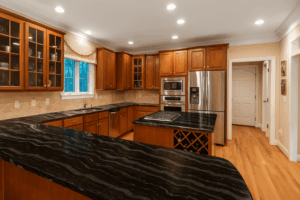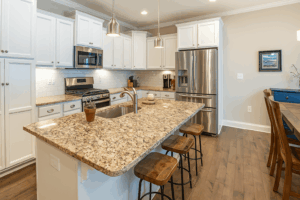10 essential things homeowners should understand before investing in granite for their kitchen
Most people walk into granite showrooms looking for a color they love. That’s a start, but it’s not enough. Granite is a significant investment, and getting it right means going beyond looks.
Before you commit to a slab, here are 10 critical things every homeowner should understand to avoid mistakes and choose the right granite countertop for their kitchen.
What Should You Know Before Choosing Granite Countertops?
10 tips that will help you make the right call the first time

1. Every Granite Slab Is Unique — Inspect Yours in Person
Granite isn’t like engineered quartz. No two slabs are exactly alike, even if they come from the same quarry. The color, veining, and movement can shift drastically within the same-named variety.
That means the sample you see in a showroom might only tell part of the story.
Tip: Always view the full granite slab before making a decision. Walk around it. Look at it in natural light. A beautiful slab on screen may look too busy or too muted in your actual kitchen.
2. Sealing Is Required — And Needs Maintenance Over Time
Granite is a natural stone, and most varieties are porous. That means it can absorb moisture, oils, and spills if not sealed properly.
Some homeowners assume once it’s installed, it’s good to go. But most granite requires periodic sealing to stay stain-resistant.
What to know:
- White granite and lighter stones are usually more porous.
- Darker granites may need less frequent sealing.
- Ask your fabricator what your specific stone requires.
Neglecting this step over time is how beautiful countertops end up with dull spots or stubborn stains.
3. Consider How It Will Look With Cabinets, Backsplash, and Tile
Granite might be the star of the kitchen, but it doesn’t perform solo. The color and pattern of your stone need to work with your cabinets, backsplash, flooring, and even wall paint.
Too much contrast can feel chaotic. Too little can feel flat.
Pro tip: Bring actual samples with you when viewing slabs—cabinet door fronts, tile swatches, even a paint chip. Seeing how everything plays together will help you choose the perfect granite for your space, not just the one that looks good on its own.
4. Lighter Colors Aren’t Always More Delicate — Ask About Durability
There’s a common myth that white granite is fragile and black granite is always strong. That’s not how it works.
Durability is about the mineral composition of the slab, not just its color. Some light-colored granite performs beautifully, while some dark slabs can be more prone to cracking or etching.
What matters:
- Ask about the grade of granite you’re considering.
- Discuss your lifestyle—kids, pets, cooking habits—so your fabricator can guide you toward a stone that matches how you’ll actually use your kitchen.
5. Think About Finish — Polished, Honed, or Leathered?
Granite isn’t just about the color and pattern; the finish makes a big difference in both aesthetics and maintenance.
Here’s what to know:
- Polished granite has a glossy, mirror-like shine. It’s classic and dramatic but can show fingerprints and smudges more easily.
- Honed granite has a soft, matte appearance. It looks more understated and hides surface wear well, but may show stains if not sealed well.
- Leathered granite has a textured, pebbled feel. It’s great at hiding fingerprints and is popular for rustic or modern kitchens.
Each finish changes the look, feel, and behavior of the surface; choose based on how you want to live with it day-to-day.
6. Choose Function First, Then Color and Pattern
It’s easy to get distracted by a dramatic pattern or a trending granite color, but if the stone doesn’t work for your space, it’s not the right choice.
Before locking in a slab, ask:
- Will this hide crumbs or highlight every smudge?
- Will it reflect too much light in a sunlit kitchen?
- Is it more prone to staining or etching?
Color and pattern matter, but not more than function. A kitchen countertop should work hard, not just look good in photos.
7. Understand What Affects Cost — It’s Not Just Square Footage
The price of granite countertops doesn’t stop at dollars per square foot. Yes, that’s your starting number, but here’s what else can move it up:
- Edge profiles (simple eased vs. ogee or waterfall)
- Sink or cooktop cutouts
- Fabrication complexity (backsplash return, curves, angles)
- Stone rarity: exotic granite from overseas or rare quarries will always cost more
- Granite grade: lower grades may be cheaper, but they’re more prone to flaws or inconsistent patterns
When budgeting, think slab + fabrication + install. That’s the real number.
8. Ask If the Granite Is Suitable for High-Use Areas
Granite is strong, but not all types are created equal when it comes to real-world use.
Some slabs are more porous, softer, or prone to surface issues like etching or chipping. Others can handle years of daily use with minimal maintenance.
If your kitchen sees a lot of action, kids, meal prep, and entertaining, don’t pick your stone based on how rare it is. Pick it based on how well it performs.
Ask your fabricator if the stone is suited for high-use areas, or better left for a powder room or low-traffic bar.

9. Could Quartz Be a Better Fit for Your Space?
If you’re drawn to granite but hesitant about sealing, staining, or natural variation, it might be worth comparing options.
Quartz countertops are engineered for uniformity and require less maintenance. They don’t need sealing, and the color is more predictable from slab to slab, ideal for modern or minimalist kitchens.
This isn’t about pushing you toward one material. It’s about helping you make the smartest choice based on how you live, how you clean, and what you expect out of your countertops.
10. The Fabricator Matters as Much as the Material
You can find the perfect granite slab, but if it’s installed by the wrong hands, you’ll regret it. Precision is everything. At Distinctive Surfaces, we handle every step in-house with tools and processes that ensure quality:
- Laser templating for accurate digital measurements
- CNC fabrication for clean, exact cuts
- No subcontractors, our team installs what we fabricate
- Clean seams, solid installs, and timelines you can trust
If you’re planning on new granite countertops, don’t leave the final result to chance. Work with a team that finishes what Mother Nature started.
Want Help Choosing the Right Granite for Your Kitchen?
Book a No-Pressure Consultation
Our team helps homeowners choose the perfect granite countertop, not just the prettiest one in the warehouse. Whether you’re remodeling your kitchen or just starting to explore your options, we’ll help you compare slabs, avoid common mistakes, and get a fit that actually works for your space.
FAQs About Choosing Granite Countertops
How do I choose the perfect granite color for my kitchen?
Start with your cabinet color, lighting, and overall design style. Lighter kitchens often pair well with warm beige or white granite, while darker kitchens can handle deeper hues like black granite or blue-gray tones. Bring samples and test under your kitchen lighting if possible.
Is granite a good choice for busy kitchens?
Yes, granite is an excellent choice if you choose a durable variety and commit to occasional sealing. It resists heat and scratching better than many other countertop materials, making it a top option for active homes.
What’s the best finish for granite countertops?
It depends on your kitchen style and usage. Polished granite offers a sleek, glossy look but can show smudges. Honed or leathered finishes are more subtle and better at hiding fingerprints, especially in high-traffic kitchens.
Does granite need to be sealed every year?
Not always. Some dense granite kitchen countertops need sealing every 1–3 years, while others can go longer. Ask your fabricator about your specific type of granite and maintenance schedule.
How do I know I’m getting quality granite?
Work with a trusted fabricator. They’ll help you inspect the quality of the granite, check for cracks or filler, and ensure your granite slab is free of major defects. Seeing the full slab in person is always recommended.

